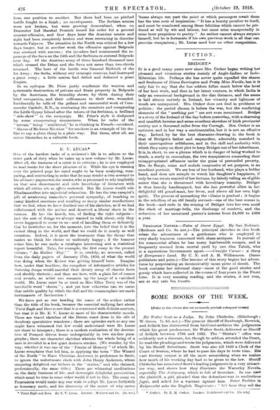E. V. LUCAS.* ONE of the hardest tasks of a
reviewer's life is to adhere to the strict path of duty when he takes up a new volume by Mr. Lucas. After all, the business of a critic is to criticize ; he is not employed to read books for the sheer pleasure of it. While his eye is running over the printed page his mind ought to be busy analysing, com- paring, and contrasting in order that he may render a true account to his ultimate paymaster, the reader, who is presumed to rely implioitly on that nice discernment and wide knowledge of literature with which all critics are ex officio endowed. But Mr. Lucas would wile Rhadamanthus into unjudicial relaxation. He has the true essayist's gift of awakening immediate personal sympathy, of touching so many .kindred emotions and recalling so many similar recollections that we feel, when we have finished one of his sketches, as if we had collaborated with the author and deserved a liberal share in the success. He has the knack, too, of finding the right subjects— just the sort of things we always wanted to talk about, only they never happened to occur to us—and of handling them so delicately that he bewitches us, for the moment, into the belief that it is the easiest thing -in the world, and that we could do it nearly as well ourselves. Indeed, it is more the treatment than the theme that makes us think his choice so uniformly happy ; if the humour seizes him, he can make a catalogue interesting and a statistical report beautiful. Take, for example, the first essay in the present volume, " An Earlier ' Day.' " It is, crudely, an account, culled from the daily papers of January 27th, 1859, of what the world was doing when the Kaiser was getting himself born. Imagine how, under that headline, the compilers of informative articles for Saturday Snaps would marshal their dreary array of chaotic facts and shoddy rhetoric ; and then see how, with a plain list of names and events, an artist can summon up the image of a vanished world,. Mr. Lucas must be as tired as Miss Ellen Terry was of the inevitable word " charm " ; and yet how otherwise can we name that subtle quality by which the dull and the commonplace are made instruments ,of fascination ?
We have put as our heading the name of the author rather than the title of his book, because the essential unifying fact about 'Twist Eagle and Dove is not that it is concerned with definite matters, but that it is Mr. E. V. Lucas in most of his characteristic moods. There are travel sketches of the Devon coast done in his rdle of desultory speculative wanderer ; there are episodes such as any one might have witnessed but few could understand were Mr. Lucas not there; to interpret ; there is a modem realization of the destruc- tion of Pompeii driven home unforgettably in two six-line para- graphs ; there are character sketches wherein the whole being of a man is revealed in a few quiet decisive strokes. (We wonder, by the way, whether it was one of the " Freaks of Memory " of which Mr. Lucas eomplains that led him, in applying the term " The Wizard of the North " to Hans Christian Andersen in preference to Scott, to ignore the unfortunate clash with John Henry Anderson, whose conjuring delighted our fathers in the sixties," and who claimed, professionally, the same title.) There are whimsical meditations on the daily business of life, and downright delightful perversities, which must be true in some other world if not• in this. The essay on Possessions would make any one wish to adopt Mr. Lucas forthwith as honorary uncle, and his discovery of the secret of why motor • 'Twizt Eagk and Dove. By E. Y. Lucas. London : Methuen and Co. Oa. net.]
'buses always run past the point at which passengers -await them has the true mote of inspiration: " It has a beauty-peculiar to-itself, and must be numbered among those felicities which cannot be pro- dueed at will by wit and labour, but must arise unexpectedly in some hour:propitious to poetry." An author cannot always surpass himself, but he is fortunate if his own previous wotk is all that can provoke comparison ; Mr. Lucas need fear no other competition.


































 Previous page
Previous page